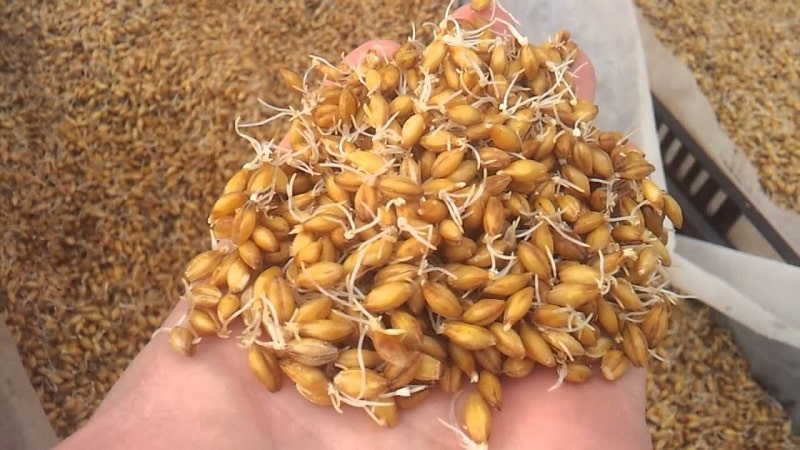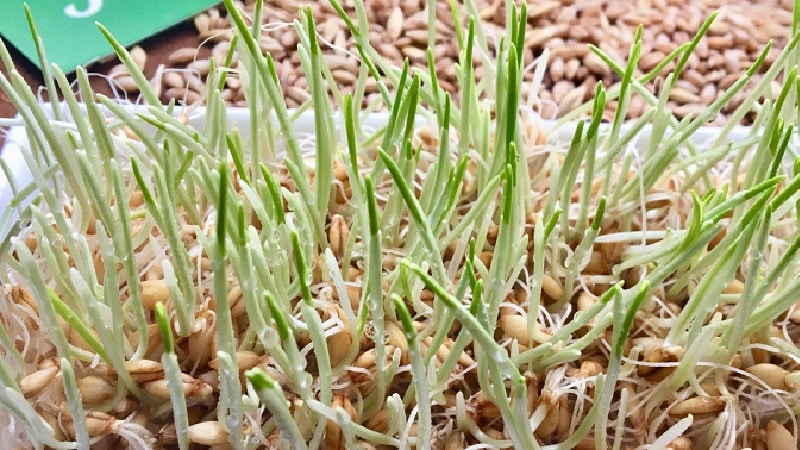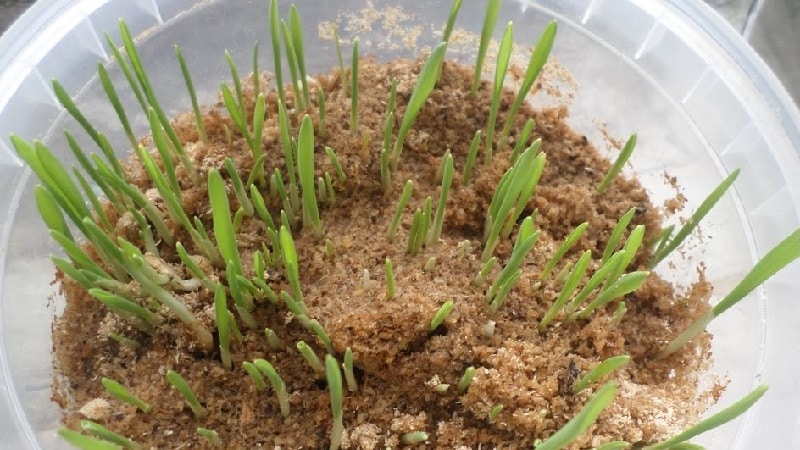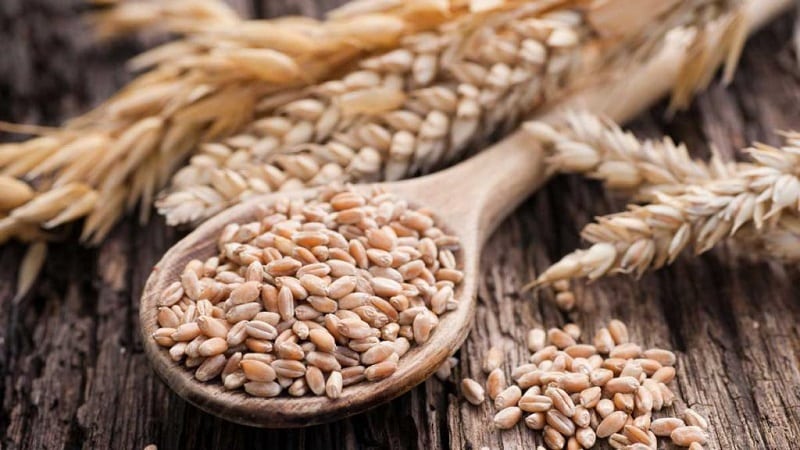How to germinate barley at home and why it is needed
Sprouted barley is a biologically active food supplement that improves overall human health. The product increases the body's defenses, cleanses and replenishes deficiencies of vitamins and minerals, and activates the endocrine system.
We will tell you in our article how to germinate barley at home and how much you can consume without harm to your health.
Properties of sprouted barley
At the initial stage of barley germination, biochemical processes are accelerated, due to which the grains have a beneficial effect on the body:
- kill bacteria;
- relieve inflammation;
- tone;
- envelop the walls of the stomach, preventing trauma and irritation of the mucous membrane;
- stimulate the immune system;
- cleanse from waste and toxins;
- lower body temperature.
Chemical composition and nutritional value
Sprouted barley is rich in vitamins:
- B1 (thiamine);
- B2 (riboflavin)
- B4 (choline);
- B5 (pantothenic acid);
- B6 (pyridoxine);
- N (biotin);
- PP (niacin);
- E (alpha tocopherol).
The grain contains minerals:
- potassium;
- calcium;
- silicon;
- magnesium;
- sodium;
- sulfur;
- phosphorus;
- chlorine;
- boron;
- vanadium;
- iron;
- iodine;
- cobalt;
- manganese;
- copper;
- molybdenum;
- nickel;
- selenium;
- fluorine;
- chromium;
- zinc.

Nutritional value of the product per 100 g:
- calorie content – 288 kcal;
- proteins – 10.3 g;
- fats – 2.4 g;
- carbohydrates – 56.4 g;
- water – 14 g;
- fiber – 14.5 G;
- ash – 2.4 g;
- sucrose – 0.51 g;
- glucose – 0.2 g.
Sprouted barley contains large amounts of:
- enzymes and pectins that improve digestion;
- essential amino acids;
- antioxidants.
Benefits and harms
Nutritionists recommend eating sprouted barley grains for:
- general strengthening of the body;
- increase metabolism;
- regulation of the heart and thyroid gland;
- increasing iron levels in the blood;
- normalization of the central nervous system;
- normalization of blood pressure;
- lowering cholesterol and sugar;
- decrease excess weight;
- strengthening hair follicles;
- liver cleansing;
- restoration of musculoskeletal and cartilage tissue;
- eliminating free radicals;
- collagen synthesis;
- skin rejuvenation;
- increasing immunity;
- activation of sexual function.
Official medicine does not prohibit and even insists on the inclusion of sprouted grains in the diet for such conditions and diseases as:
- sugar diabetes;
- angina;
- dermatitis;
- polyarthritis;
- bronchitis;
- furunculosis;
- insomnia;
- disturbance of intestinal microflora;
- deficiency of vitamins and minerals;
- tuberculosis;
- asthma;
- infertility;
- sinusitis;
- thrombophlebitis;
- osteoporosis;
- haemorrhoids;
- prostatitis;
- pharyngitis;
- obesity;
- disorders of the cardiovascular, digestive and genitourinary systems.
The dietary supplement is well tolerated by the body and causes virtually no side effects. In rare cases, individual allergic reactions may occur.
Attention! Doctors advise people over 65 years of age to use sprouted barley with caution due to its high fiber content, which causes intestinal colic and flatulence.

How to properly germinate barley
Barley is sold in specialized health food stores, but the grains can be sprouted without problems at home in an ordinary glass container between layers of gauze.Automatic grain sprouters make the process easier. Water is poured into the unit, prepared grains are poured in and the optimal mode is selected. The system independently irrigates the barley, regulating the humidity level. This technique is suitable for those who sprout grain in large quantities.
We will tell you about the easiest way to obtain biologically active sprouts using available materials.
Bean selection
Suitable for germination are unpeeled grains (in shells) of high quality, without signs of mold, collected no earlier than two months ago. This product retains all the beneficial substances.
Optimal conditions
Grains begin to germinate at an air temperature of at least +20° C and a sufficient level of moisture. Do not allow the material to dry out; spray it with water every day. If you follow the germination rules, sprouts will begin to appear in 2-3 days.
Germination instructions
The process of obtaining biologically active barley has the following sequence of actions:
- Rinse the grains with boiled water cooled to room temperature and soak for 48-72 hours.
- Change the water every seven hours.
- Place the barley between layers of cheesecloth and place in a glass bowl. Cover with a lid and place in a dark place. Do not lay out a layer more than 2-3 cm, otherwise the material will turn sour.
- Irrigate the top layer periodically with water and ventilate the grains once a day for 15 minutes. To do this, remove the lid and remove the gauze.
- After the grain has sprouted and the length of the shoots is 1-3 mm, place the material in a colander and rinse with boiled water.
Reference. The most useful are seedlings 2-3 mm long. They contain the maximum amount of vitamins and minerals.
There is another way to germinate barley - for malt. This is a labor-intensive process that takes time. The material is selected taking into account the percentage of germination, which should reach 90%.
The sequence of actions is the same, with the difference that the length of the sprouts should be one and a half times the size of the grain. It is also necessary to increase the humidity level after the first seedlings hatch. Spraying the grains more frequently will help with this. The optimal air temperature is +15° C. The whole process takes about a week. The barley is then dried and kept in linen bags for a month before being made into drinks.

Terms and conditions of storage
Sprouted barley for human consumption should be stored for no longer than 24 hours. refrigerator.
Malted barley is stored in the refrigerator for 48-72 hours. To increase shelf life, the product is dried at a temperature of 50-55 ° C.
How to use
Sprouted barley is best digested in the morning. The grains can be eaten whole, chewing thoroughly. They serve as an excellent addition to salads and sandwiches. The grains rolled in a meat grinder are mixed with honey, nuts, raisins, dried apricots, prunes, dates, figs, herbs, and lemon. It turns out to be a very tasty pasta.
Healthy milk is prepared from sprouted grains. To do this, grind the barley into a homogeneous mass using a blender and add two glasses of water. The mass is placed on a sieve, wiped, then filtered through cheesecloth and diluted with water to the desired consistency. It is used to make delicious cocktails with banana, apple, berries, and dried fruits.
Barley jelly is useful for gastrointestinal diseases and diabetes. Sprouted and dried grains are scrolled through a meat grinder, a little cold water is added, then boiling water, left for 10-12 minutes and filtered.
Decoctions increase the production of breast milk, regulate sugar levels, treat colds and coughs, liver and kidney diseases. This drink is even given to infants as a nutritional supplement.
Norms for the use of sprouts
Nutritionists recommend gradually introducing sprouted grains into the diet, starting with 1-2 teaspoons. As the body gets used to it, the norm is increased to 60-70 g per day.
Where else is sprouted barley used?
Sprouted barley grains are used for baking bread. To do this, grind them into a homogeneous mass and knead the dough. The bread turns out to be very nutritious, retains minerals, vitamins, fiber, amino acids, and proteins. This product brings much more benefits than white bread made from refined flour.
Malt is prepared from barley - sprouted grain in which starch is converted into sugar necessary to produce alcohol. Beer, moonshine, and whiskey are made from it.
Contraindications
Healthy people have nothing to fear from the possible negative effects of sprouted barley on the body. The product is often well tolerated with the exception of individual intolerance to the components.

It is completely contraindicated to consume grain if:
- chronic discomfort in the gastrointestinal tract (constipation, loose stools);
- stomach and intestinal ulcers;
- flatulence;
- colic;
- cholelithiasis in the acute stage;
- pancreatitis.
Advice. A drinking regime will help reduce the harmful effects of fiber on a weakened intestine. Drink at least 1.5-2 liters of clean water per day to improve food movement.
Read also:
Conclusion
Sprouting barley at home allows you to obtain a useful biologically active product that serves as a source of essential vitamins, minerals, amino acids, fiber and proteins. Regular consumption of grain provides energy to people leading an active lifestyle.
I couldn’t sprout it at home, so I had to order ready-made pressed sprout powder.